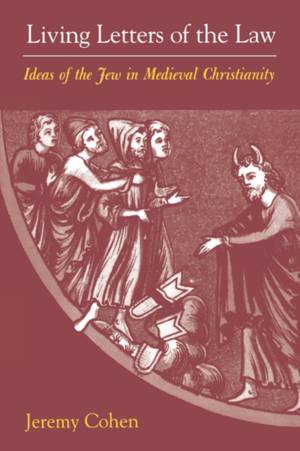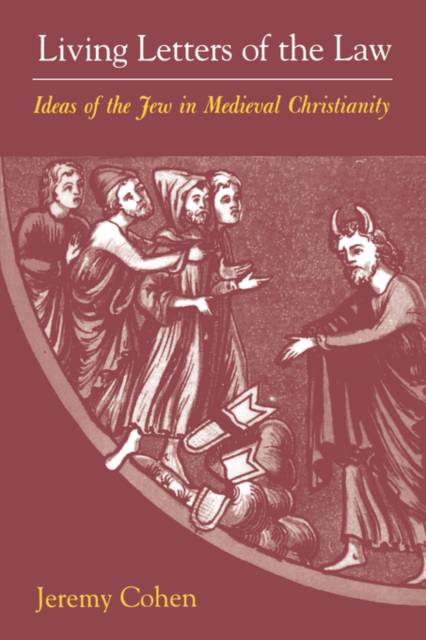
- Afhalen na 1 uur in een winkel met voorraad
- Gratis thuislevering in België vanaf € 30
- Ruim aanbod met 7 miljoen producten
- Afhalen na 1 uur in een winkel met voorraad
- Gratis thuislevering in België vanaf € 30
- Ruim aanbod met 7 miljoen producten
Zoeken
€ 66,45
+ 132 punten
Prijzen
Omschrijving
In Living Letters of the Law, Jeremy Cohen investigates the images of Jews and Judaism in the works of medieval Christian theologians from Augustine to Thomas Aquinas. He reveals how--and why--medieval Christianity fashioned a Jew on the basis of its reading of the Bible, and how this hermeneutically crafted Jew assumed distinctive character and power in Christian thought and culture.
Augustine's doctrine of Jewish witness, which constructed the Jews so as to mandate their survival in a properly ordered Christian world, is the starting point for this illuminating study. Cohen demonstrates how adaptations of this doctrine reflected change in the self-consciousness of early medieval civilization. After exploring the effect of twelfth-century Europe's encounter with Islam on the value of Augustine's Jewish witnesses, he concludes with a new assessment of the reception of Augustine's ideas among thirteenth-century popes and friars.
Consistently linking the medieval idea of the Jew with broader issues of textual criticism, anthropology, and the philosophy of history, this book demonstrates the complex significance of Christianity's "hermeneutical Jew" not only in the history of antisemitism but also in the broad scope of Western intellectual history.
Augustine's doctrine of Jewish witness, which constructed the Jews so as to mandate their survival in a properly ordered Christian world, is the starting point for this illuminating study. Cohen demonstrates how adaptations of this doctrine reflected change in the self-consciousness of early medieval civilization. After exploring the effect of twelfth-century Europe's encounter with Islam on the value of Augustine's Jewish witnesses, he concludes with a new assessment of the reception of Augustine's ideas among thirteenth-century popes and friars.
Consistently linking the medieval idea of the Jew with broader issues of textual criticism, anthropology, and the philosophy of history, this book demonstrates the complex significance of Christianity's "hermeneutical Jew" not only in the history of antisemitism but also in the broad scope of Western intellectual history.
Specificaties
Betrokkenen
- Auteur(s):
- Uitgeverij:
Inhoud
- Aantal bladzijden:
- 461
- Taal:
- Engels
Eigenschappen
- Productcode (EAN):
- 9780520218703
- Verschijningsdatum:
- 11/11/1999
- Uitvoering:
- Paperback
- Formaat:
- Trade paperback (VS)
- Afmetingen:
- 152 mm x 228 mm
- Gewicht:
- 616 g

Alleen bij Standaard Boekhandel
+ 132 punten op je klantenkaart van Standaard Boekhandel
Beoordelingen
We publiceren alleen reviews die voldoen aan de voorwaarden voor reviews. Bekijk onze voorwaarden voor reviews.













